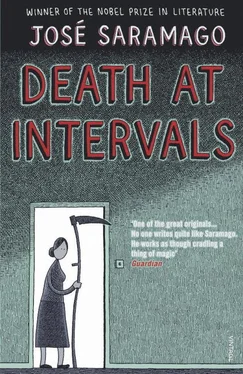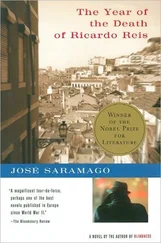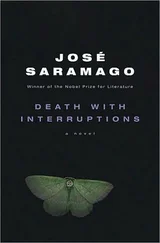WE’VE ALL HAD our moments of weakness, and if we manage to get through today without any, we’ll be sure to have some tomorrow. Just as beneath the bronze cuirass of achilles there once beat a sentimental heart, think only of the hero’s ten years of jealousy after agamemnon stole away his beloved, the slave-girl briseis, and then the terrible rage that made him return to war, howling out his wrath at the trojans when his friend patroclus was killed by hector, so, beneath the most impenetrable of armours ever forged and guaranteed to remain impenetrable until the end of time, we are referring here, of course, to death’s skeleton, there is always a chance that one day something will casually insinuate itself into the dread carcass, a soft chord from a cello, an ingenuous trill on a piano, or the mere sight of some sheet music open on a chair, which will make you remember the thing you refuse to think about, that you have never lived and that, do what you may, you never will live, unless … You had sat coolly observing the sleeping cellist, that man whom you could not kill because you got to him when it was too late, you saw the dog curled up on the carpet, and you were unable to touch that creature either, because you are not his death, and in the warm darkness of the room, those two living beings who, having surrendered to sleep, didn’t even know you were there, only served to fill your consciousness with an awareness of the depth of your failure. In that apartment, you, who had grown used to being able to do what no one else can, saw how impotent you were, tied hand and foot, with your double-o-seven licence to kill rendered null and void, never, admit it, not in all your days as death, had you felt so humiliated. It was then that you left the bedroom for the music room, where you knelt down before suite number six for the cello by johann sebastian bach and made those rapid movements with your shoulders which, in human beings, usually accompany convulsive sobbing, it was then, with your hard knees digging into the hard floor, that your exasperation suddenly vanished like the imponderable mist into which you sometimes transform yourself when you don’t wish to be entirely invisible. You returned to the bedroom, you followed the cellist when he went into the kitchen to get a drink of water and open the back door for the dog, first, you’d seen him lying down asleep, now you saw him awake and standing up, and perhaps due to the optical illusion caused by the vertical stripes on his pyjamas he seemed much taller than you, but that was impossible, it was just a trick of the eyes, a distortion due to perspective, the pure logic of facts tells us that you, death, are the biggest, bigger than everything else, bigger than all of us. Or perhaps you’re not always the biggest, perhaps the things that happen in the world can be explained by chance, for example, the dazzling moonlight that the musician remembers from his childhood would have shone in vain if he had been asleep, yes, chance, because you were once again a very small death when you returned to the bedroom and went and sat down on the sofa, and smaller still when the dog got up from the carpet and jumped onto your girlish lap, and then you had such a lovely thought, you thought how unfair it was that death, not you, the other death, would one day come and douse the mild embers of that soft animal warmth, that is what you thought, imagine that, you who are so accustomed to the arctic and antarctic cold of the room to which you have returned and to which the voice of your ominous duty summoned you, the duty to kill the man who, as he slept, seemed to bear on his face the bitter rictus of one who has never shared his bed with a truly human companion, who had an agreement with this dog that they would each dream about the other, the dog about the man, the man about the dog, this man who gets up in the night in his striped pyjamas to go to the kitchen for a drink of water, obviously it would be easier to take a glass of water to his room when he goes to bed, but he doesn’t do that, he prefers his little night-time saunter down the corridor to the kitchen, in the midst of the peace and silence of the night, with the dog who always follows him and sometimes asks to be let out in the garden, but not always, This man must die, you say.
Death is once again a skeleton swathed in a shroud, with the hood low over her forehead, so that the worst of her skull remains covered, although it was hardly worth going to the trouble of covering up, if this really did concern her, because there’s no one here to be frightened by the macabre spectacle, and especially since all that can be seen are the tips of the bones of fingers and toes, the latter resting on the flagstones, whose icy chill they do not feel, the former leafing, like a rasp, through the pages of the complete volume of death’s historic ordinances, from the first of all rules, which was set down in three simple words, thou shalt kill, to the more recent addenda and appendices, in which all the manners and variants of dying so far known are listed, and you could say of that list that it was inexhaustible. Death was not surprised by the negative results of her researches, it would, in fact, be incongruous, more than that, superfluous, to find in a book that determines for each and every representative of the human race a full stop, a conclusion, an end, a death, such words as life and live, such words as I’m alive and I will live. There is only room in that book for death, not for absurd hypotheses about what to do if someone escapes death. That has never been known. Perhaps, if you looked hard, you might find once, and only once, in some unnecessary footnote, the words I lived, but that search was never seriously attempted, which leads one to conclude that there is a very good reason why not even the fact of having lived deserves a mention in the book of death. And the reason is that the other name for the book of death, as it behoves us to know, is the book of nothingness. The skeleton pushed the regulations to one side and stood up. As was her custom when she needed to get to the nub of a problem, she walked twice round the room, then she opened the drawer in the filing cabinet that contained the cellist’s card and took it out. Her gesture has just reminded us that now is the moment, now or never, yet another instance of chance, to clarify an important aspect relating to the functioning of these archives and about which, due to reprehensible neglect on the part of the narrator, we have not yet spoken. Firstly, and contrary to what you may have imagined, the ten million index cards filed away in these drawers were not filled out by death, they were not written by her. Certainly not, death is death, not a common clerk. The cards appear in their places, arranged alphabetically, at the exact moment when someone is born, only to disappear at the exact moment when that person dies. Before the invention of the violet-coloured letters, death didn’t even go to the trouble of opening the drawers, the comings and goings of the cards took place without any fuss or confusion, there is no memory of there ever having been any embarrassing scenes with some people saying they didn’t want to be born and others protesting that they didn’t want to die. The cards of the people who die go, without anyone having to take them, to a room below this one, or, rather, they take their place in one of the rooms that lie in layer upon subterranean layer, going ever deeper, and which are already well on the way to the fiery centre of the earth, where all this paperwork will one day burn. Here, in the room occupied by death and the scythe, it would be impossible to establish a similar criterion to the one adopted by a certain registrar who decided to bring together in one archive the names and documents belonging to the living and the dead under his protection, yes, every single one, alleging that only when they were brought together could they represent humanity as it should be understood, an absolute whole, independent of time and place, and that keeping them separate until then had been an attack upon the spirit. That is the enormous difference between the death we see before us now and the sensible registrar with his papers of life and death, while she prides herself on her olympian disdain for those who have died, we should remember the cruel phrase, so often repeated, which says that what’s past is past, he, on the other hand, thanks to what we, in current phraseology, call historical awareness, believes that the living should never be separated from the dead and that, if they are, not only will the dead remain for ever dead, the living will only half-live their lives, even if they turn out to live as long as methuselah, about whom, by the way, there is some dispute as to whether he died at nine hundred and sixty-nine as stated in the ancient masoretic text or at seven hundred and twenty as stated in the samaritan pentateuch. Clearly not everyone will be in agreement with the daring archivistic plan put forward by that registrar of all the names given and yet to be given, but we will leave it here, in case it should prove useful in the future.
Читать дальше












